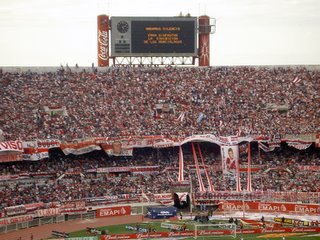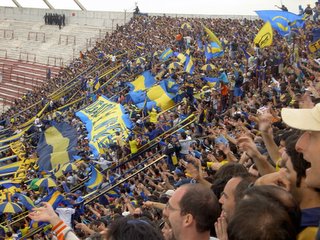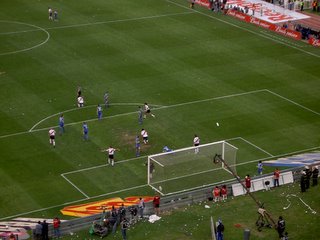Boca vs. River
 Despite their miserable season, River fans were dedicated to packing their stadium and draping it in red and white.
Despite their miserable season, River fans were dedicated to packing their stadium and draping it in red and white.The night before the derby a friend of mine surprised me with an extra ticket. Only after dishing out 80 pesos (approx. US$26), did I find out how rare my ticket was. I would be going to the game under the most dodgy of circumstances: as one of the 4,500 visiting Boca fans in a stadium packed with 60,000-plus River fans.
In the days leading up to the match, tens of thousands of Boca fans spent hours lining up, fighting with one another and the police, for this scarce sum of seats. Essentially, landing one of these tickets was as impossible as crossing Avenida 9 de Julio in just one green light – a street which is dubbed as the ‘widest avenue in the world’, about 16 lanes wide, and takes about 3 to 5 minutes to cross.
Given the poor level of play on the field, by far the most exhilarating part of the match was entering the stadium. The security surrounding River Plate’s stadium gave one the feeling that a hated foreign leader was visiting (think Bush in Mar de Plata). Boca fans took a tightly barricaded path to the stadium, lined with riot geared police atop horses.
As I became engulfed by hundreds of Boca fans making their way to the first of three ticket check-points, I sensed an indescribable tension I have never felt before. The equation behind my uneasiness seemed to boil down to a combination of the following: an hincha’s unconditional love for his team + a few Quilmes beers + a joint or two + a possible criminal record + a life long disdain for the police + most importantly, an ingrained hatred for all that is River Plate = inevitable violent encounters.
Since River fans were pre-emptively kept a few blocks away from the Boca fans, the police were the only enemies within striking range. I witnessed several intoxicated fans insult, spit, throw rocks at the cops. Being the professional police service that it is,
The turmoil then took a turn for the surreal. Several dilapidated buses, inexplicably escorted by police cruisers, arrived at the crowded check point, which then parted like the
La 12 was exempted from presenting tickets or stopping at any security posts. Once the buses entered, the mob’s impatience and belligerence resumed, and my awe of the entrance I had just witnessed was overtaken by the original sense of fear. I badly wanted to photograph the events, but taking out a digital camera seemed at tad risky.
The only sense of comfort I had was that I was going to the game with a die hard Boca fan who has attended countless River-Boca classics. On numerous occasions he repeated: “Keep your ticket in your pocket. Don’t make eye contact with anyone who looks drugged. And if someone bigger than you asks for your money, give it up, no questions asked. Don’t take out your camera till we're in. Most importantly, don’t lose your ticket.”
When we finally made it to the third and final check point at the stadium gates, I pulled out my ticket, expecting to pass it through the electronic turnstile. How naïve of me. No one was using the turnstiles. Tickets were to be handed over to high ranking barra brava men, including Rafa Di Zeo, the presumed Boca head honcho, who is still wanted to appear in court for inciting violence. Police and River Plate officials quietly watched the corruption carry itself out.
Exercising the god-like powers of a mobster, I watched El Rafa decide who got to enter the stadium and who didn’t. At one point, he pointed to a guy and said: “What have you done for Boca!? How come you didn’t come to
After witnessing a few more incidents between crazed fans and the repression happy police, I was relieved to finally be inside the stadium. Once we squeezed our way to the very top row of Boca’s standing room only section, I realized that I was attending a soccer game and not trying to sneak into a prison.
 Boca fans, about 5,000 of them, crammed into this standing-only section of the stadium and as usual, made their presence felt.
Boca fans, about 5,000 of them, crammed into this standing-only section of the stadium and as usual, made their presence felt.
The level of play was so poor that it’s not worth commenting on. Early on people around me started displaying their disgust for first-place Boca’s laidback attitude in a game they were supposed to win against a struggling River. By half time everyone around me was convinced that a fix was on to end the game in a tie, appeasing the fans and keeping tensions to a minimum.
Indeed, the 0-0 result meant that everyone left the stadium in a strikingly different manner in which they entered it. People were quiet, non-violent, and disappointed that they dished out so much cash to watch a hyped up match end up in a scoreless draw.
I was happy enough to survive my first superclásico.


5 Comments:
Great post Diego. The article was excellently written and I could imagine what it was like to be there.
What does BUDGE mean? Someone told me what the Boca sign means, but I forgot...
Ingeniero Budge is a barrio en Lomas de Zamora, a Buenos Aires suburb. People generally put the name of their barrio on the flag of their team's colours.
very nice, and interesting to hear from your point of view.
Buenísimo el post!!!! y las fotos Diego!!!
Post a Comment
<< Home